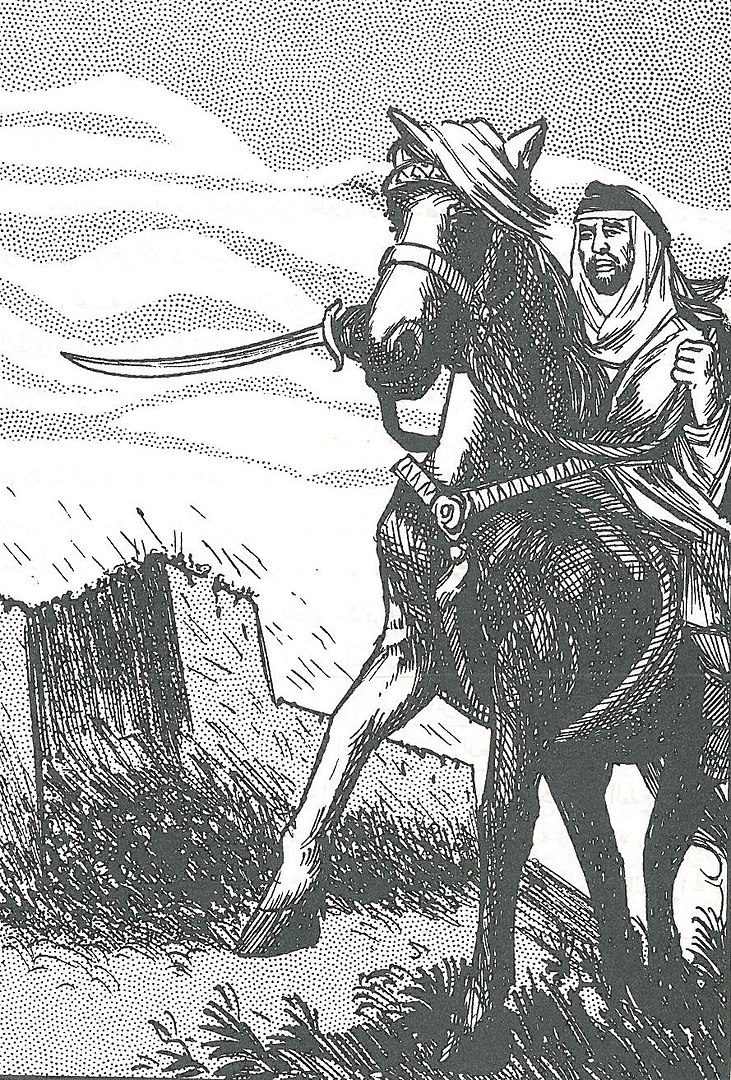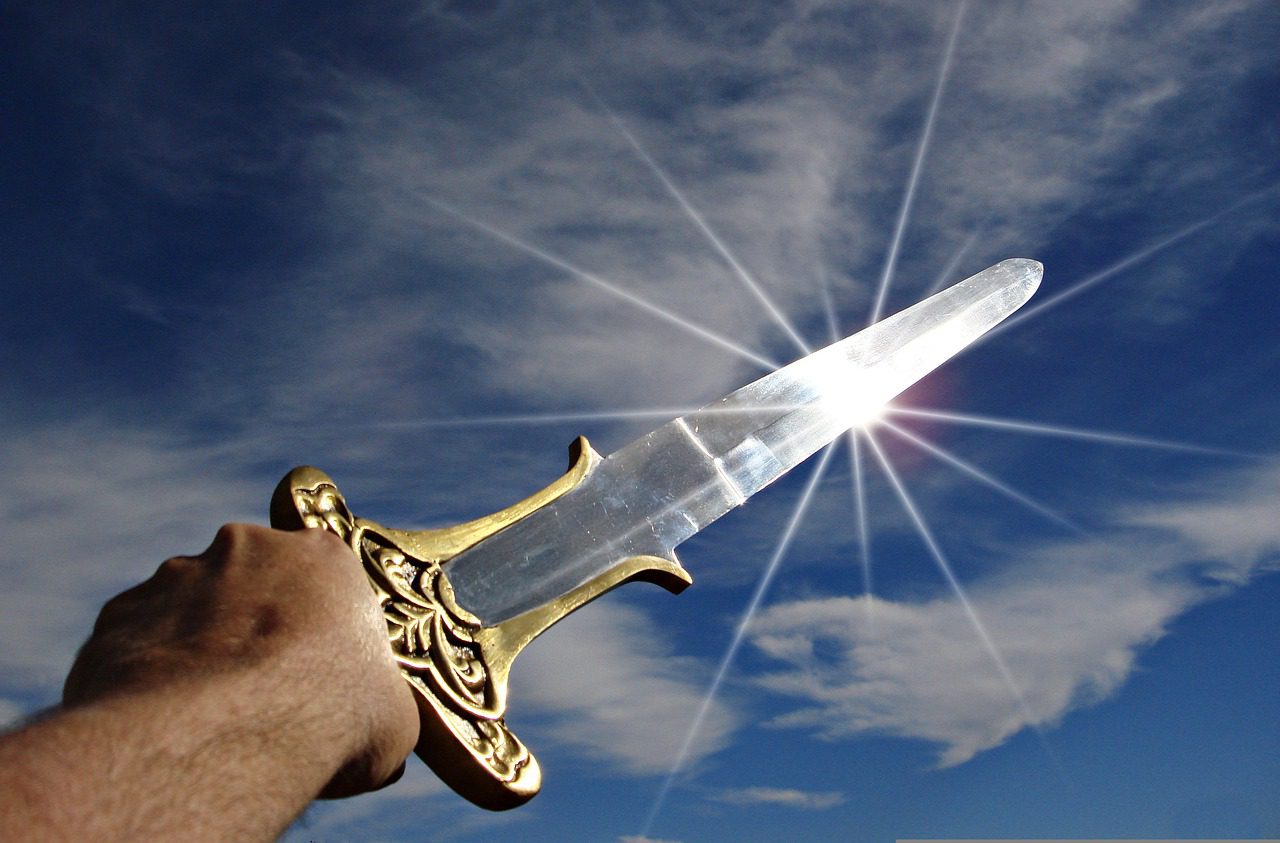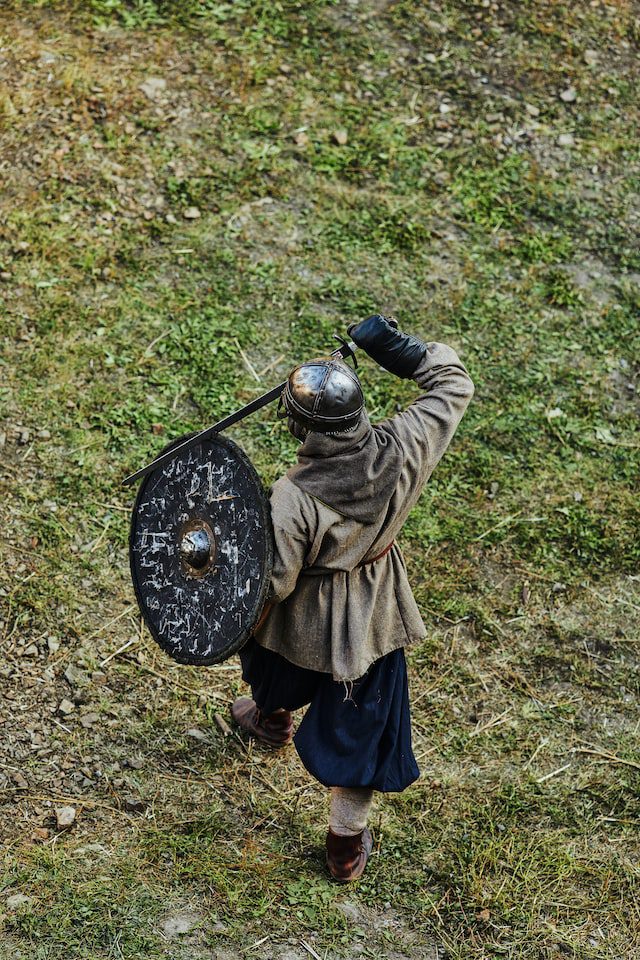
Khalid ibn al-Walid fighting the Byzantines during the Battle of Yarmouk. image by Unknown author-Wikimedia
Top 10 Fascinating Facts about Khalid ibn al-Walid
Khalid Ibn Al-Walid was a companion of the Islamic prophet Muhammad. He lived from 592 to 638. He is one of early Islam’s most seasoned and accomplished generals.
He played the leading military role in the Ridda Wars against rebel tribes in Arabia in 632–633, the initial campaigns in Sasanian Iraq in 633–634, and the conquest of Byzantine Syria in 634–638.
He is noted for his military tactics and prowess, commanding the forces of Medina under Muhammad and the forces of his immediate successors of the Rashidun Caliphate; Abu Bakr and Umar ibn Khattab.
It was under his military leadership that Arabia, for the first time in history, was united under a single political entity, the Caliphate. Commanding the forces of the nascent Islamic State, Khalid was victorious in various battles, against the forces of the Byzantine-Roman Empire, Sassanid-Persian Empire, and their allies, in addition to other Arab tribes.
1. He was undefeated in over 100 battles

Khālid ibn al-Walīd heading the Muslim Army during the battle of Yarmouk. photo by Unknown author-Wikimedia
Khalid bin Walid was undefeated in 41 battles (100 if minor engagements are considered) against professional Persian and Roman armies. He was a man built for war.
He was a military genius who had a sharp strategic mind, brilliant tactical skills, and the strength and endurance to go up against any champion of the enemy. He was probably the only general in history to possess all of these instruments of war in one man.
2. Khalid’s nickname was “Sword of Allah”
Khalid became one of Islam’s greatest military leaders of all time. The Holy Prophet Muhammad himself gave Khalid ibn al-Walid the title of “Saifullah” translating to “Sword of God.”
This was after his amazing leadership in the Battle of Mu’tah. This huge title was given to the same man who was once against Muslims.
Up until Muhammad’s passing in 632 AD, Khalid helped the Muslims capture Mecca, Yalamlam, and Tabuk thus, solidifying the Islamic state under Muhammad.
3. He is one of the first generals to have used psychological warfare
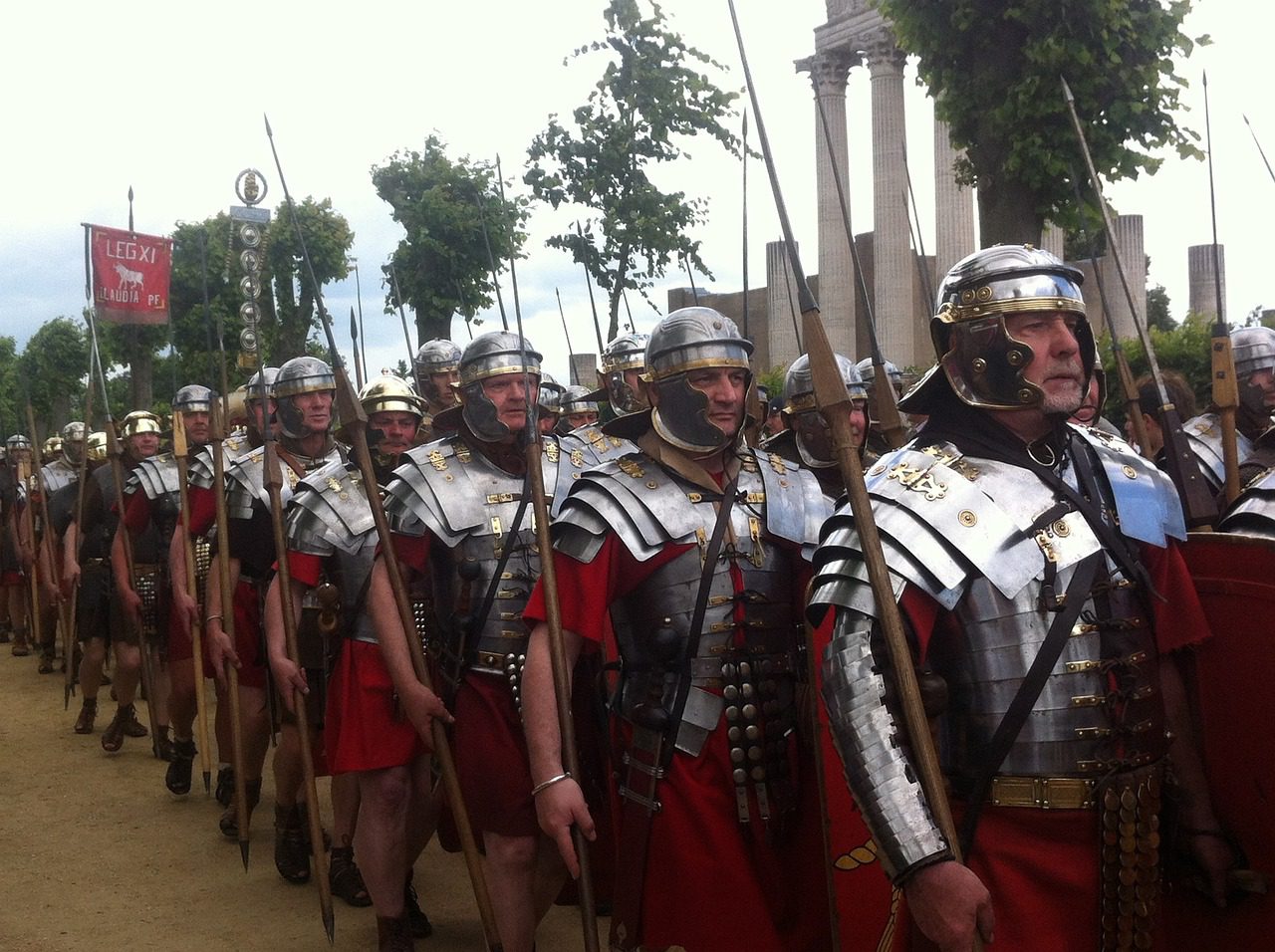
Image by Judith Meyer from Pixabay
Psychological welfare can be defined as things that are done to make an enemy become less confident or feel hopeless, or afraid. It was not common then. Khalid is credited with being one of the first generals to make effective use of psychological warfare.
He was able to maintain his heavily outnumbered army of 3,000 men against a massive army of 200,000 of the Byzantine Empire and Ghassanid Arabs in what would be known as the Battle of Mu’tah.
He sent some soldiers behind the main army. Before the battle, they were instructed to join the Muslim army in small bands, one after the other, giving an impression of a fresh reinforcement, thus lowering the opponent’s morale. Believing a trap was waiting for them, the Byzantine troops did not pursue it.
4. Khalid wanted to die as a martyr in the field of battle
Live by the sword die by the sword. This is how Khalid would have preferred to leave this world. He wanted to make his exit a martyr in the field of battle. However, Allah had his plans.
Within less than four years of his dismissal, Khalid died and was buried in 642 in Emesa, where he lived since his dismissal from military services.
His tomb is now part of a mosque called Khalid ibn al-Walid Mosque. Khalid’s tombstone depicts a list of over 50 victorious battles that he commanded without defeat (not including small battles).
5. Khalid was not always Muslim

Photo by Rumman Amin on Unsplash
It is hard to imagine that this glorious Islam soldier was not always Muslim. He was actually from a Mecca tribe of the Quraysh. This was a powerful merchant tribe that opposed the Prophet, Muhammad.
His first cousin Abu Jahl organized the boycott of the holy prophet’s plan in 616. However, in 628 after The Treaty of Hudaybiyyah which was a truce between the Muslims and the Quraysh. He decided to convert or as Muslims would say re-birthed Islam.
The Prophet told him that conversion to Islam meant that all his past sins were forgiven by Almighty Allah. He insisted that he was sincere. The Prophet prayed for him to be forgiven for whatever he had done to Islam and the Muslims before his conversion to Islam.
6. He was a great tactician
Khalid’s successful military career was owed to great military tactics. He won many battles successfully with his flank maneuver tactic. Flanking is a tactic where the forces are attacked from both sides of the enemy at the same time.
Some of the battles where he was most successful with these tactics are the Battle of Walaja, The Battle of Ullais, as well as The battle of Uhud. The indirect approach was another tactic he often used. This together with his versatile implementation brought a lot of victories.
He would attack opposing armies from unexpected directions with multiple rapid flanking maneuvers. Furthermore, he was one of only a few commanders in history who used double envelopment to encircle and destroy armies larger than his own.
7. Rumored to have killed a prisoner, just to marry his wife
Khalid is considered to be a war hero by the Sunni Muslims. However many Shia Muslims consider him to be a war criminal. This is because he ended up executing a prisoner named Malik and marrying the prisoner’s wife on the same night, she became widowed.
The death of Malik and Khalid’s marrying of his wife Layla created controversy. Some officers of his army believed that Khalid killed Malik to take his wife. He was called back to Medina to explain himself. Some have argued that Umar later dismissed him from army service over this.
8. Khalid led a Roman commander to convert to Islam
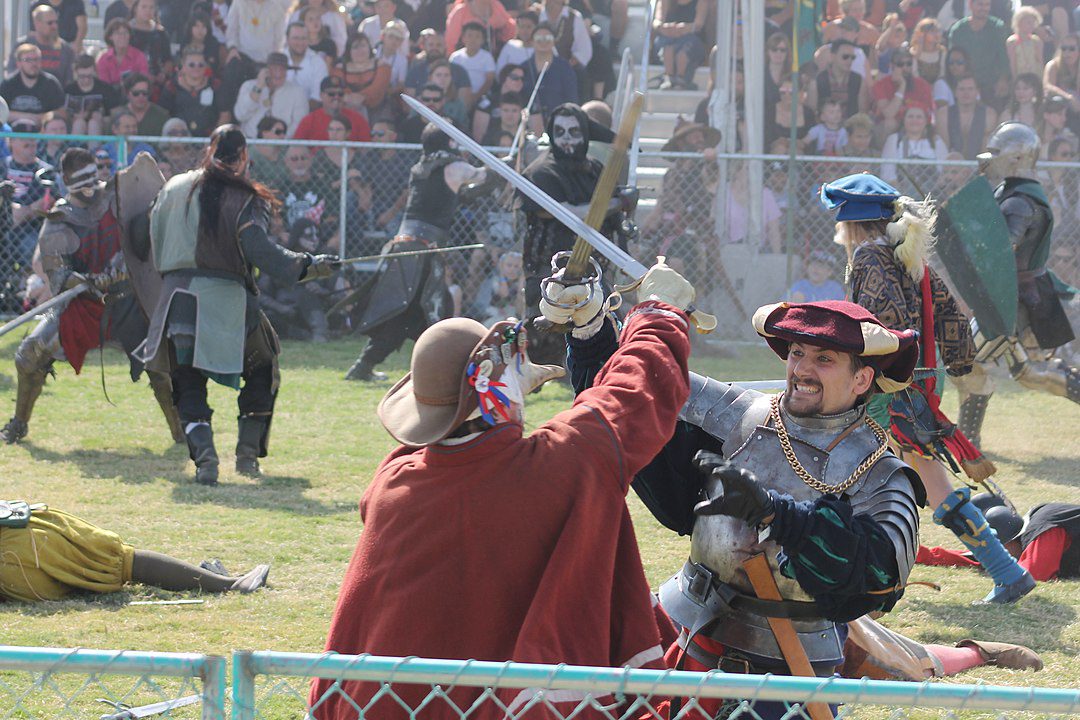
image by Noah Wulf-Wikimedia
Khalid was often seen as a genius. Even his enemies were in awe of him. One Roman commander asked him if it was true that the Almighty sent down a sword from Heaven to His Prophet, and he, in turn, gave to him, and that no one could stand it.
Khalid did not instill fear in the enemy, he told him the truth. He explained how he came to be called the Sword of God. He continued to talk about how he worshiped one God and how Allah rewarded those that praised him.
The Roman commander was intrigued and asked him to teach him, Islam. He joined the faith and fought along with the Muslim army only to die as a martyr In the Cause of Allah.
9. Khalid fought not for his glory but for Allah
Khalid was humble. He knew that his victories came from Allah. His humility was shown in the famous battle of Yarmouk.
Amid that critical battle, Khalid received a letter in which he was informed of the death of Abu Bakr and the instructions of the new Caliph that he make Abu Obaidahh in charge. He was not outraged that he had not been promoted.
He kept the matter in secrecy until victory was achieved to avoid any possible confusion in the army He then went to Abu Obaidahh to put himself under his command. To Khalid, it made no difference whether he was in command or a soldier as long as he was fighting for the sake of Almighty Allah.
10. Khalid still held on to his old ways months into conversion
Change does not come easy. Many times people backslide from their religion. Khalid being human was not left out. Six months into his conversion he still held on to his old ways.
He had been sent to invite the Banu Jadhimah tribe to Islam. They started saying ‘Saba’na, Saba’na’ (we became Sabians). Khalid took them prisoners and started executing some of them, due to past enmity. He was stopped by Abdur Rahman bin Awf.
Muhammad got very angry when he heard of Khalid’s behavior. He paid money to the relatives of the dead and compensated for the property destroyed and alienated from Khalid’s doing.
Planning a trip to Paris ? Get ready !
These are Amazon’s best-selling travel products that you may need for coming to Paris.
Bookstore
- The best travel book : Rick Steves – Paris 2023 – Learn more here
- Fodor’s Paris 2024 – Learn more here
Travel Gear
- Venture Pal Lightweight Backpack – Learn more here
- Samsonite Winfield 2 28″ Luggage – Learn more here
- Swig Savvy’s Stainless Steel Insulated Water Bottle – Learn more here
Check Amazon’s best-seller list for the most popular travel accessories. We sometimes read this list just to find out what new travel products people are buying.

